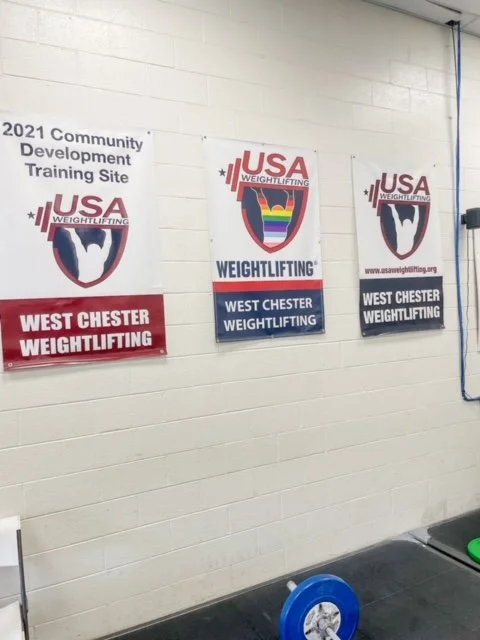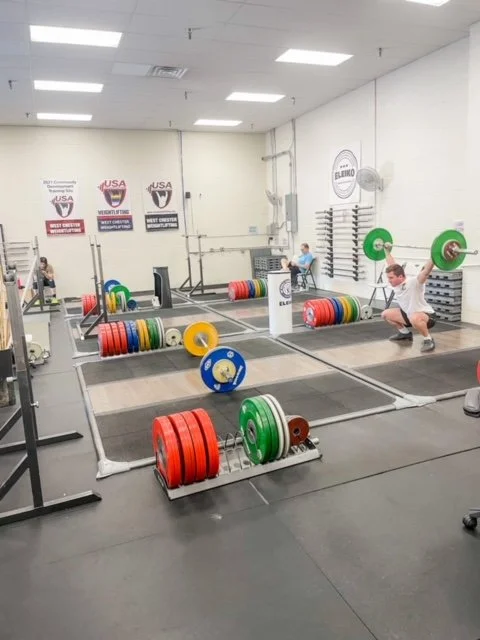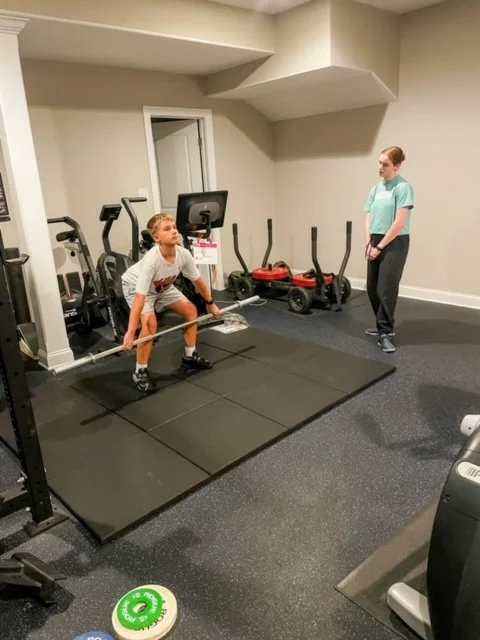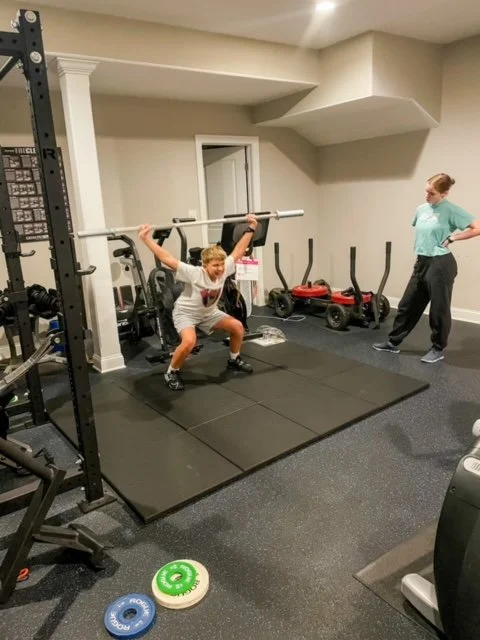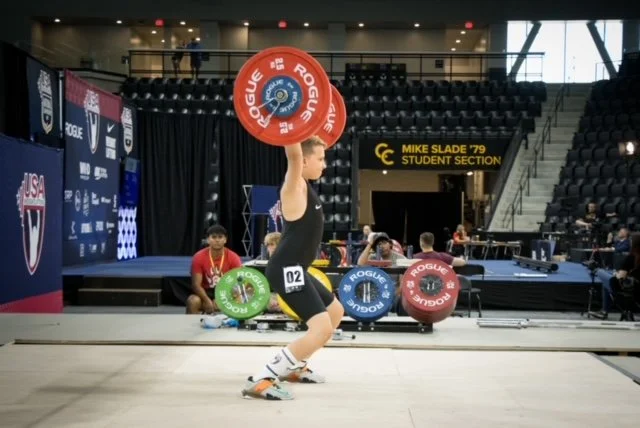Olympic Weightlifting For Kids Is So Much More Than the Number on the Plate
I spend eleven months of the year coming up with ideas for my September blog articles. It’s the only month where I get to write about kids. Each September, I shift my focus from boring adult stuff to the fun kid stuff. While doing my “field work” throughout the year, I come across so many great kid programs in our area. Programs that I didn’t know about until I started to dig a little. Programs that I am thrilled to be able to share with you all in hopes of sparking some little person’s interest. And this story might just be the best example of that to date and yet another reason why I love to do what I do.
A few months ago, I saw a friend post about her young son’s recent olympic weightlighting competition.
As soon as I saw her post, I had to know more. First off, I was of the erroneous and outdated belief that growing bodies should not be lifting weights. (Turns out that’s only true if they are lifting without proper supervision). So what was a then 5th grade boy doing suspending nearly 50 pounds above his head? Second, I couldn’t believe that olympic weightlifting was even available to kids in our area. This is not your run of the mill after school sport so where does one do this? And lastly (which I had to wait until my interview with 11 year old Jackson Benchener to find out), how the heck did he learn about this sport and decide he wanted to not only do it, but compete across the country within only months of starting?
Is Weightlifting Safe For Kids?
To answer my first question, Jackson’s mom sent me an article from Stanford Medicine titled “Weight Room No Longer Off-Limits to Kids.” See, what did I know?! The old belief that growth is stunted by lifting weights is wrong. “Growth plate fractures have not been reported in programs designed by experts with proper supervision.” In fact, much like adults, there are many benefits to strength training for kids. Not only does muscle strength improve, but bone density, ligaments and tendons are all strengthened. Athletic performance improves. Confidence and focus develops. And overall, injuries are prevented, when a child learns how to properly lift the right amount of weight. “If a child is old enough to take part in organized sports, then they are probably old enough to begin training with weights.” However, this article goes on to say that “Kids should not take part in weightlifting or power lifting… [and] avoid body building which fuses on building muscle mass.” So I guess I wasn’t totally wrong to question the safety of this sport for kids. And the debate does in fact continue…
When I asked the coaches that I met with for this post, they were quick to respond. Weightlifting was deemed safe for some but not all children. Each child is different: their maturity level; their ability to focus; their physical constraints. While there is no particular age that automatically gets the go ahead for weightlifting, the recommended starting age for girls is as young as 8 and boys is 10, based solely on their maturity level. You want a kid who will focus on form over the amount of weight he or she is lifting. Also, direct one-on-one training is a must for a younger athlete in this sport. After observing a group training session for older teens and adults at the gym and a one-on-one session with the 11 year old that is the focus of this post, I saw what a long, slow, repetitive and sometimes, boring process is involved with weightlifting. So no, it’s not for every kid.
I could write a whole article on the hot topic of whether weightlifting is safe for kids, but I don’t want that to be the focus of this particular post. So here are a few articles that could help settle this debate for you. How Young is Too Young; Olympic Lifting Safe; Children and Olympic Weightlifting. For me, after observing Jackson, who is the focus of this particular post, I support olympic weightlifting for kids. Kids who are like Jackson.
Where Can Kids Learn Olympic Weightlifting?
For the “where in the world can kids do this” question, I visited West Chester Weightlifting where Jackson learned the sport and currently trains. This is not your typical gym. It’s unlike anything I have observed in my fitness finding. At first glance, it could look like a CrossFit gym, meaning there was equipment that I would expect to see at Crossfit. But with a closer look, this gym was mostly bars and colored plate weights with only a few barbell stations.
There was a group training session going on but you might not know it. Nine members were part of this group. They were various levels, various ages and consisted of both male and female members. They came and went at different times. They were doing different things and in different areas of the gym. Owner, Ryan Marciniszyn, was the “floor coach”. He would spend time observing from afar and jumping in with advice and to answer questions as the members of this group worked on their own.
They “lifted”— that’s what I am calling it, but they were doing all different types of exercises that might look like the same thing to someone like me. And then they took a long break, asked Ryan a question or two, or examined their notes. Actually, most of the room looked like they were on a break. But they were working through their exercises mentally, analyzing their own techniques, and working out nuances that most people wouldn’t understand. Again me. There is no one size fits all with weightlifting. Each member of the group came to the session with different goals and different paths to get there.
And while kids cannot be part of this particular group setting at West Chester Weightlifting, this is exactly why the sport might not be suitable for some kids while it does wonders for others. A kid who wants the action, the immediate gratification, and to lift the big weights wouldn’t fare well in weightlifting. The kid who is dedicated, focused, patient, coachable, and accountable will benefit from this sport far more than just getting stronger.
One Boy’s Experience with Weightlifting
And this is where young Jackson comes in. I kicked off my chat with Jackson Benchener by asking him to tell me what olympic weightlifting is. Because I kinda still didn’t really know, even after visiting the gym. (This is the technical definition “Weightlifting is basically a sport that consists of lifting weights explosively from the ground to overhead using two specific lifts. The snatch moves the weight from the ground to overhead in one powerful movement. The clean and jerk is a two-part movement where the weight is first moved to the shoulders and then pushed overhead. Weightlifting is the only weight-based sport in the Olympics.” as defined here. But I like Jackson’s answer better.) Jackson paused and thought about it for a while. Then he answered that weightlifting is “technique over strength”. And Jackson’s coach, Maeva Rulis, immediately beamed with pride. Her trainee really understood the sport that she had been doing for almost a decade (and she is still in high school!). Jackson and his coach, Maeva, are quite an impressive duo, I know.
I’ve mentioned it before but Jackson is only eleven years old and is in 6th grade at TE Middle School. Jackson has played football and baseball for many years. He was looking to get stronger for these sports and started working out with his dad in the family’s home gym (which is pretty insane as far as home gyms go) before school. Jackson’s dad suggested weightlifting. Jackson immediately agreed because “he wanted to compete.” So his mom found West Chester Weightlifting and Jackson started to train there last December. And only six months later, Jackson was on his way to Nationals in Colorado to compete. He admits to picking it up fast but was already physically strong.
Jackson’s mom describes him as a “cerebral athlete”. He likes to analyze and think before acting. He likes the individual aspect of this sport for a change. While Jackson says weightlifting has allowed him to improve in baseball and football by getting stronger, his mom says the sport has brought him confidence and improved his focus in other areas of his life.
Maeva Rulis, Jackson’s coach who works with him at his house and in the gym twice a week, grew up with “gym rat” (as she puts it) parents who were into olympic weightlifting. Even as a young girl, it was natural for her to start weightlifting at the age of ten. Now, when she isn’t in school herself (she is a high school senior), she spends a lot of time coaching kids in olympic weightlifting. She enjoys introducing young people to the sport that she loves so much. “My purpose for coaching is to spread the joy that weightlifting gives me.” She appreciates the body awareness and focus the sport brings to her youngest trainees. And I guess because she is also technically a kid herself, she makes the sport fun and relatable.
When I was observing Maeva with Jackson, she immediately told me to watch the funny faces Jackson makes when he lifts. He didn’t get mad or embarrassed but agreed with her and laughed. Maeva and Jackson just seemed to get each other and were so in sync. At times they spoke in their secret weightlifting language, which I didn’t follow. It was very inspiring to sit in on this training session for many reasons.
Jackson showed me the two exercises that he did back in June during Nationals. The snatch and the clean and jerk. He prefers the clean and jerk over the snatch. You can see his demonstration of both on my Instagram. These are the two main moves for the sport. And Jackson works with Maeva every week to perfect them. Maeva will keep things interesting by having Jackson work on all sorts of variations of these two moves. She recognizes that otherwise practice could get boring for kids.
A few things surprised me during my work on this article that I want to leave you with: The first is the amount of young women who partake in this sport. At the gym, I spoke with another 18 year old female coach, Morgan Wagner. In fact, all four coaches right now at West Chester Weightlifting are women. Morgan was part of Team USA when she was only 14 years old! She speaks fondly of her experience with the sport and emphasizes the importance of female empowerment. “As a young girl, learning olympic weightlifting helped me gain trust and confidence in my body, which, I think, heavily benefitted the relationship I have with myself today.”
The second surprise I encountered is that I totally expected Jackson to boast about the amount of weight he lifted during Nationals, where he placed third in the country for his age. I mean, he is a kid! And regardless, it’s something to be super proud of. But surprisingly, it never came up in our conversation. So I had to ask him. And guess what, Jackson had no clue what he lifted in Colorado. As surprising as that is, it proves how much Jackson’s focus is on all the right things in the world of weightlifting. And that is exactly why he has found such quick success and will continue to succeed in olympic weightlifting.
I want to thank Jackson and his family for sharing their story with me and for giving me into a little glimpse into the sport that is transforming their son in more ways than one.


